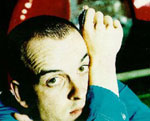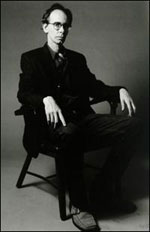Swing Out, Brother
| |

|
As you know, it don't mean a thing
if it ain't got that swing, although Matthew Herbert's big band album, Goodbye
Swingtime (Accidental), is loaded with Meaning. Not that I fully understand
the ´meaning' of using specific books as sample sources other than, perhaps,
to remind listeners that a: books exist, b: some of them talk about Important
Things, c: reading is a potential alternative to watching 'Big Brother' or
going to rubbish clubs. These are admirable points to make, even if they're
not the ones Herbert is making.
On one of the pages of the accompanying booklet it says ´READ MORE BOOKS', which is not as easy as it sounds. I mean, how many hours are there in a day? You could sleep less, but doctors tend to advise against that. You could watch less telly, but when Bill Oddie's about to show us what's going on in that blue tit nest, or Channel Five are showing another classic Jean-Claude Van Damme movie, well, it's hard to resist. Anyway, just reading more of any old kind of books isn't the point, surely. The BBC is trying to get us to do that - READ MORE OF ANYTHING! - as if book groups and animated worms are going to change the public from being semi-literate to Interesting and Intelligent people - like those who voted Harry Potter and Winnie the Pooh into their ´Big Read' Top 100. It's also suggested that we ´START NO WARS'. I guess this is aimed at Bush or Blair, in case they buy a copy. Let's face it, starting wars wouldn't be easy for fans of Herbert...I mean, one of them would have to become an MP (or their national equivalent), then get elected as party leader before becoming president/prime minister. Then they would have to either invade a country, an important country in a sensitive area, mind you, or have weapons of mass destruction, or the potential to make them. There would be no point invading a little country somewhere that no-one cares about. Not easy at all... Matt is advocating The Word as a weapon, which is a good thing. The trouble is that Bush, Blair and all the others are using it too. It's called propaganda. Besides, when it comes down to it, although the pen being mightier than the sword is a nice ideal if you've got tanks, guns, missiles, bombs, soldiers, and suicidal fanatics at your disposal... A recent photo in The Wire featured a close up of Herbert's tip-toeing shoes standing on a pile of books that are ´sampled' on the album. They include Chomsky's Rogue States, Milan Rai's War Plan Iraq, and other serious political texts, as well as Michael Moore's Stupid White Men. I've never read Chomsky but I saw one of his books once, on a friend's bookshelf. I think I picked it up and flicked through. I have no intellectual credibility when it comes to socio-cultural political theory, or whatever it might be called. Those who are doubtful of Herbert's understanding of such things might liken the Wire photo to the Tony Hancock sketch when he borrowed The Rise and Fall of the Roman Empire whilst in the library. To the assistant's amazement he used it to stand on and reach a book called Lady Don't Fall Backwards. It's one of many classic Hancock jokes, but I'm not suggesting it's relevant to Herbert. |

| Having sampled mundane everyday objects for his Dance music and now abandoned the cheese grater for Chomsky his literal use of the book as an instrument is so subtle that you wouldn't recognise the material. It's still the most fun (even though it isn't much ´fun') that anyone will ever get from political/theoretical texts. It's also fitting that an artist railing against social oppression should use such covert methods but, unlike the CIA, Matt has to name his sources to make his point. Sampling a Tony Parson's novel might produce the same sound, but not the same ´meaning'. Although he's keen to encourage reading it's ironic that the physical nature of these ´precious' objects, rather than their literal content, is the real source of pleasure.
The sound of Matt Herbert's big band is something like Gil Evans, sometimes, and maybe George Russell, now and again. For a minute it might be Stan Kenton's band playing City of Glass, or even Weill & Brecht. They don't sound like Benny Goodman or Basie, which is probably why it's called Goodbye Swingtime. But does this ´warning' make the album any more attractive to someone who's never entertained the idea of buying a big band album in the first place? I notice a brief interview to accompany a glowing review of the album in this month's Muzik magazine. This is the result of Herbert's history as a Dance Music maker, but the idea that a Muzik reader will buy this album seems incredible. Have I been underestimating them all these years? Are some of them actually capable of enjoying and appreciating a record like this? Between clubbing and having so much Fun and buying the soundtrack to their wild and crazy youth perhaps Muzik readers, some Muzik readers, are listening to Out Of The Cool. As potentially the first big band album that many will buy it would be great if it inspired them to start collecting Ellington. This, however, seems as likely as BBC viewers choosing Tropic of Cancer as their all-time favourite book. Goodbye Swingtime has been casually dismissed with a one-liner in one magazine, but careless talk can cost record sales, and in this case that would be a shame. This response represents the notion that the album is no more than another example of a worthless genre, and not a good one at that. How anyone can hear this album and not be amazed by its audacity is beyond me. Perhaps I've missed all the other big band albums that have reinvented the medium recently. Another review suggested that it might be some kind of ´answer' to the electronica cul-de-sac. As if the knob-twiddlers of the world might suddenly consider forming big bands and learning to write songs with complex harmonies and totally original source material consisting of politically significant texts. Matt Herbert has emerged from the Dance scene apparently unscathed, which is something of a miracle. He's moved from click-beat minimalist House-type stuff and bringing Astaire-like pizzazz to the po-faced ´electronica' set to this, the best damn ´modern jazz' album anyone who's dabbled in Dance music has ever made. Perhaps playing piano in a big band at the age of 14 has something to do with it, as well as being asked by the director of a French breakbeat musical (I kid you not) to compose three big band tunes. I last met him at a Bootsy Collins gig where he told me that he was playing piano, ´jazz' piano, and I confess that I didn't imagine him working towards being the Brubeck of his particular kind of beat generation. I thought he would just add a few ´jazzy' touches to his next set of tunes for swinging clubbers, not come up with something as good as this. Goodbye Swingtime doesn't fit into any ´scene'; not the retro-chic of Easy or the traditional market for jazz. It doesn't even fit the modernist-tech stereotype because it's not Hancock-electro-shock-fusion or jazz-with-scratching-and-beats. Big band purists won't like it for many reasons, not least because Jamie LidelI isn't a ´proper' jazz singer, and they wouldn't like the electronic element, even though it's the most subtle application of technology to jazz since the first, Gil Melle's Tome VI. I'd be surprised if the mainstream jazz crowd take it seriously. This record's too damn strange. Perhaps I should stop assuming what Muzik readers and jazz fans will like. Perhaps it will be a best-seller in Mole Jazz record shop and no1 (or even no21?) in the Muzik-readers poll of all-time ´classics' the next time they do one... Jamie Lidell sings twice, in fact. I particularly like the first example, ´Everything's Changed', where he proves that it's not necessarily stupid of white men, especially young white men from the leftfield dance groove arena, to sing in a soul-jazz style. As part of Super Collider he's had some practise but I think Matt's realised his full potential here. |

| Arto Lindsay sings
too, on the track that he co-wrote with Herbert, ´Fiction', which sounds like a post-No-Wave syncopated big band funk-not-funk classic, if there could ever be such a thing. Aspiring writers will find the line ´Fiction is easy' ironic, but I guess he's not talking about being the next Graham Greene. What, exactly, Herbert is talking about across these tracks is not easy to work out. ´Here people start / Here people end' isn't much help. Neither is ´Follow the meaning / Read all the books / Pick out the reading / Be as dumb as you look'. Does he want us to read more books or not? Is he suggesting that the answers don't lie in slavishly following what's written, and we should therefore question everyone, including Chomsky? I think he's just improvising, poetically, and whilst that may annoy those hoping for literary greatness aligned with astute political theory, it's fine by me. I'm
all for ambiguity, aspiration, even naivety, in art. ´Turning Pages' is something of a tribute to Elmer Bernstein once it's stopped sounding like a tribute to Terry Riley, which in itself is a brilliant way to start a track. It's possibly the most ´formal' piece, and one of the few instrumentals. The way the seven-plus minutes pass, without one solo (there are no ´proper' solos anywhere), and never lapsing into idle riffing, is a tribute to the album's arranger, Pete Wraight. Sometimes the sounds gently percolate, as on ´The Three ´W's', and they almost swing through ´The Battle'. The latter is suitably bombastic and, as it shifts gears, gets the post-production wizardry treatment from Herbert. The album's infused with technology trickery that serves the overall sound without ever overriding the harmonic or melodic purpose. One of the highlights for me is ´Misprints', complete with a handclap effect created from ´newspaper clippings about Iraq from around the world shaped in to instruments and filled with popcorn, rice and foreign coins', no less. Sounds stupid? It works, believes me, and demonstrates the method, as well as the ´meaning', in the madness. It's driven by a typically refined micro-groove and gives saxophonist Dave O'Higgins a rare chance to exercise his chops. This is a big band idea that steps back in time to leave most other notions of ´new' jazz way behind. By using an old template Herbert has somehow made hip-bop and Improv-tech seem terribly dated. Not that he wishes, as far as I can tell, to consider this a ´jazz' band. On his Web site he says that using the term would be ´disastrous'. Even so, whilst standing well outside of most modern music, it doesn't fall flat compared to giants of the legacy either. © 2003 Robin Tomens |